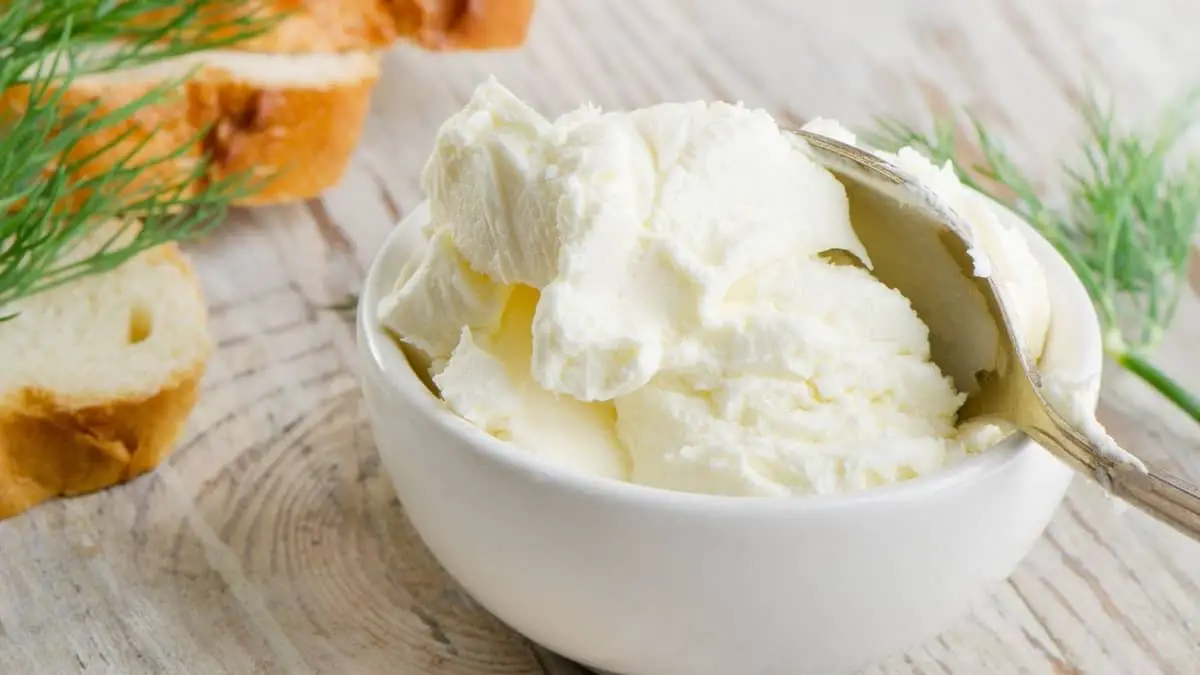Last Updated on August 6, 2022
Cream cheese is a popular ingredient in many sweet and even savory dishes. However, many people may wonder what the cream cheese sugar content is. It can be beneficial to know the nutritional value of this popular ingredient if you are on a special diet.
Cream cheese comes in many forms including whipped, spreadable, and brick. Brick cream cheese is the most popular for baking and cooking. It is a common staple in many kitchens, as it gives food a wonderful flavor and texture.
What Is Cream Cheese And How Is It Made?
Cream cheese is a mild-tasting, soft cheese that is traditionally made with milk and cream. It must contain at least 33 percent fat and have a moisture content of 55 percent or less. Unlike other cheeses, it is not meant to be matured and should be consumed fresh.
Cream cheese became popular in America in the 1800s and quickly became massed produced. It is most popular in America, but can also be found in other countries as well.
To make cream cheese, lactic acid bacteria are added to a mixture of cream and milk. This leads to the pH of the cream to decrease, which then makes it coagulate. Simply put, it separates into whey and curds.
Once the whey is removed from the mixture, the curds are heated and the stabilizers are added. This then results in the creation of cream cheese.
Cream cheese is most commonly produced in tub form (spreadable or whipped) or bricks. When baking, it is important to use the brick form. The brick version is easier to measure, softens faster, and creates a better-baked product.
In addition, the tub version isn’t as pure as the brick version and it can even have a higher water content, making it less ideal for baking. Whenever baking with cream cheese, it is important to let it reach room temperature before using it as otherwise, it will begin to curdle when you mix it into your ingredients.
Cream Cheese Nutrition
Traditional block cream cheese is high in fat and contains a small amount of protein and carbs. It is a good source of vitamin A and even has some vitamin B as well.
Generally, one ounce of cream cheese contains 99 calories and 10 grams of fat. However, the nutrition of block cream cheese will vary by brand.
Just one ounce of cream cheese contains 10% of your daily value of vitamin A. Vitamin A is important for your vision, immune system, skin, lungs, and intestines.
It even contains several antioxidants that protect your body against unstable molecules. Some strains of the lactic acid bacteria in cream cheese contain probiotics. Probiotics help support your immune system and reduce inflammation in your body.
In addition, cream cheese contains less than two grams of lactose per one ounce, which is considered low. Lactose is a type of sugar found in different dairy products. People who are lactose intolerant can often tolerate up to 12 grams of lactose in a meal.
Cream cheese sugar content
Cream cheese does traditionally not contain any added sugars. It only contains a small amount of natural sugars from lactose.
A standard packet of brick cream cheese contains around only 2.7 grams of sugar in three ounces. However, levels will vary by brand, but they will still always be low.
Flavored cream cheese spreads, such as strawberry, often contain added sugars. They will typically contain four grams of added sugar per serving.
When baking with cream cheese, sugar is added in separately. The sugar content of baked goods with cream cheese will vary vastly by recipe.
Cream cheese calories
A one-ounce serving of cream cheese will be around 99-100 calories. A whole eight-ounce package is around 792 to 800 calories.
Fat-free versions will have fewer calories, around 30 calories per one serving or 240 calories per package. However, the fat-free version is not recommended for baking as it is not rich or flavorful enough.
For the whipped version, it has around 50 calories per serving or around 400 calories per container. The whipped version also has less fat at around four grams per serving, whereas the traditional is 10 grams per serving. The whipped version, however, is not ideal for baking either.
Carbs in cream cheese
Cream cheese is relatively low in carbs. It has only two carbs per serving, though this can vary by brand.
Popular Recipes
There are many delicious recipes that use cream cheese, both sweet and savory. The most popular recipe for cream cheese is cheesecake, which you can make baked or no-bake. There are so many different cheesecake flavors you can make that are delicious with a rich, creamy texture.
In addition, you can also it to make other desserts such as pound cakes, cookies, brownies, muffins, frosting, danish and so much more. There are also many amazing savory recipes such as pasta, chicken, dips, jalapeno poppers, soup, casserole, and more. It is also a wonderful topping for bagels, crackers, and even sandwiches.

A Delicious And Flavorful Ingredient
Cream cheese has a rich, creamy consistency that is wonderful to add to both sweet and savory dishes. Not only does it provide a delicious flavor, but also an irresistible texture. You simply can’t go wrong with any dishes that use it.
Despite what many may think, it does not contain any added sugars in its traditional form. In fact, it contains less than two grams of natural sugar per serving, which is considered low. The only types that will contain added sugars are cream cheeses that are flavored, such as strawberries.
Cream cheese is simply just a combination of lactic acid bacteria, milk, and cream. It is a high-fat food, with around 10 grams of fat per serving and it is low in carbs, as well as being a good source of vitamin A. It even contains antioxidants and helpful probiotics, while being low in lactose.
Do you have any questions about the cream cheese sugar content? If so, please ask any questions regarding the nutritional facts of cream cheese in the comment section below.
Read more about Does Cream Cheese Melt?

Ever since she was a young girl, Anna has been a lover of desserts. As an adult, she enjoys
baking a variety of desserts from cakes, cookies, brownies, bread, and more from scratch. She
enjoys sharing her passion for baking with others who also have a sweet tooth. From properly
measuring ingredients to making sure they are the correct temperature, Anna knows the
importance small details can make in baking. She wants to share her experience with others in
hopes they can make the most delicious baked goods. When she’s not busy blogging, Anna
enjoys trying new recipes in the kitchen.


